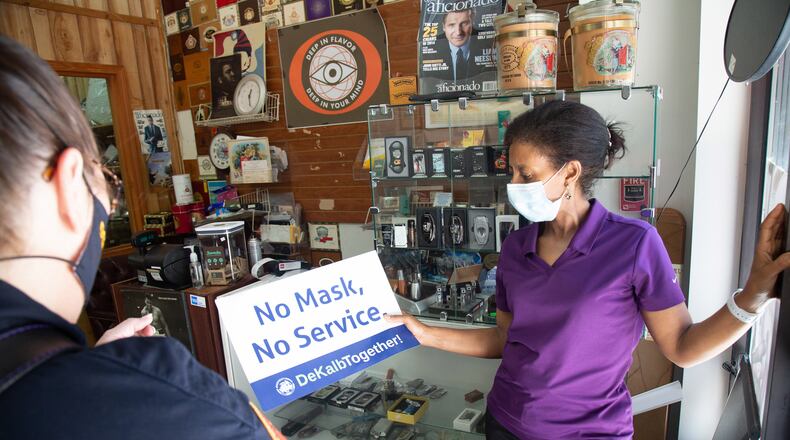Decatur, amid a surge of new COVID-19 cases and waning emergency room capacities, has joined Atlanta to be among the first Georgia cities to once again require masks.
However, city leaders decided to let businesses opt out of enforcing it.
Most of the discussion among Decatur commissioners during their Monday meeting revolved around businesses that might not participate. Whether or not to readopt the mandate was a foregone conclusion.
“By now, we should all recognize the efficacy of face coverings in slowing the spread of COVID-19 and the necessity of a face covering requirement to protect the most vulnerable members of our community,” City Manager Andrea Arnold said while pitching the policy.
The mandate mirrors the one Decatur adopted in 2020 and continuously renewed for more than a year. City leaders let it expire June 21, citing declining COVID-19 cases and relaxed guidelines for vaccinated groups by the Centers for Disease Control and Prevention. Soon after, the CDC walked back the less restrictive guidance due to a surge of coronavirus infections, primarily among unvaccinated populations.
Only about 46% of DeKalb residents are fully vaccinated, and the county has experienced a 141.7% increase in COVID-19 cases over the most recent 14-day period, according to the DeKalb Board of Health. Infection rates across Georgia are at their highest levels since January, according to data compiled by The Atlanta Journal-Constitution.
Atlanta, Athens and Savannah were the first Georgia cities to reinstate indoor mask mandates at the end of July. Cobb County on Friday will again require masks inside its government buildings. Several school districts, including Atlanta, Decatur, DeKalb and Gwinnett County, require masks for students and faculty.
The Decatur residents who spoke during Monday’s meeting wanted the same for their city.
“We know that masks can mitigate the spread,” resident April Biagioni said. She added that she hopes businesses will go one step further and ask for proof of vaccination for patrons.
Gov. Brian Kemp, who staunchly opposes government mandates for masks or proof of vaccination, announced Monday he would expand capacity at regional hospitals, increase health care staffing and close state offices Sept. 3 to encourage public employees to get vaccinated.
According to the state, Georgia’s hospital intensive care units were at roughly 88% capacity Tuesday. Emergency departments in most DeKalb hospitals were often “severely overcrowded,” on Tuesday according to the Georgia Coordinating Center. The only DeKalb hospitals that were not reporting overcrowded conditions Tuesday afternoon were Children’s Healthcare of Atlanta at Egleston and Emory University Orthopedics and Spine Hospital.
In Region D, a multi-county area including Fulton, DeKalb and Gwinnett counties, 85% of ICU beds were in use. In Region N, which includes Cobb County, more than 95% of ICU beds were occupied, according to the state data.
Decatur’s mandate carries a potential penalty of a $50 fine for violators, but Arnold said no citations were issued during the policy’s initial period. Clarkston, one of the few DeKalb cities never to let its mask mandate for public buildings expire, also has not cited any violators, according to its city manager. Many DeKalb residents weren’t aware the county never rescinded its mandate either, since it includes a “conscientious objector” clause.
Arnold argued compliance in Decatur was extremely high when the prior mandate was in place, so she expects similar results this time, despite businesses now having the option to opt out.
“If they’re going to do it, they’re going to have to make sure the public knows that they’re not participating in the enforcement of this ordinance,” Arnold said.
To opt out, businesses will have to post signage that says the business owner will not enforce the mandate. Some commissioners and parents with children under 12 years old, who don’t qualify for any current COVID-19 vaccine, expressed concern about the opt-out clause.
“I hate the opt-out option for a myriad of reasons,” Commissioner Lesa Mayer said, adding that she worried businesses that decided to not participate would face widespread backlash or boycotts from residents. She said it would be more fair to enforce the policy across the board with no exceptions.
Commissioner Tony Powers disagreed, saying it’s every business owner’s choice whether they participate. Since businesses have to post signs to say they won’t enforce the ordinance, Powers argued voluntary compliance is incentivized.
“You’re right, I don’t want to penalize someone by saying, ‘We’re signaling you out because you’re different,’” Powers said. “But if I’m that business, I’d say, ‘God, I don’t really want to be signaled out. I don’t want to be that business because people will shop where they feel safe.’”
Decatur’s ordinance also carves out exceptions for polling places, places of worship and for people with religious objections. The commissioners unanimously voted to adopt the ordinance, which is set to expire Sept. 27.
About the Author
Keep Reading
The Latest
Featured



